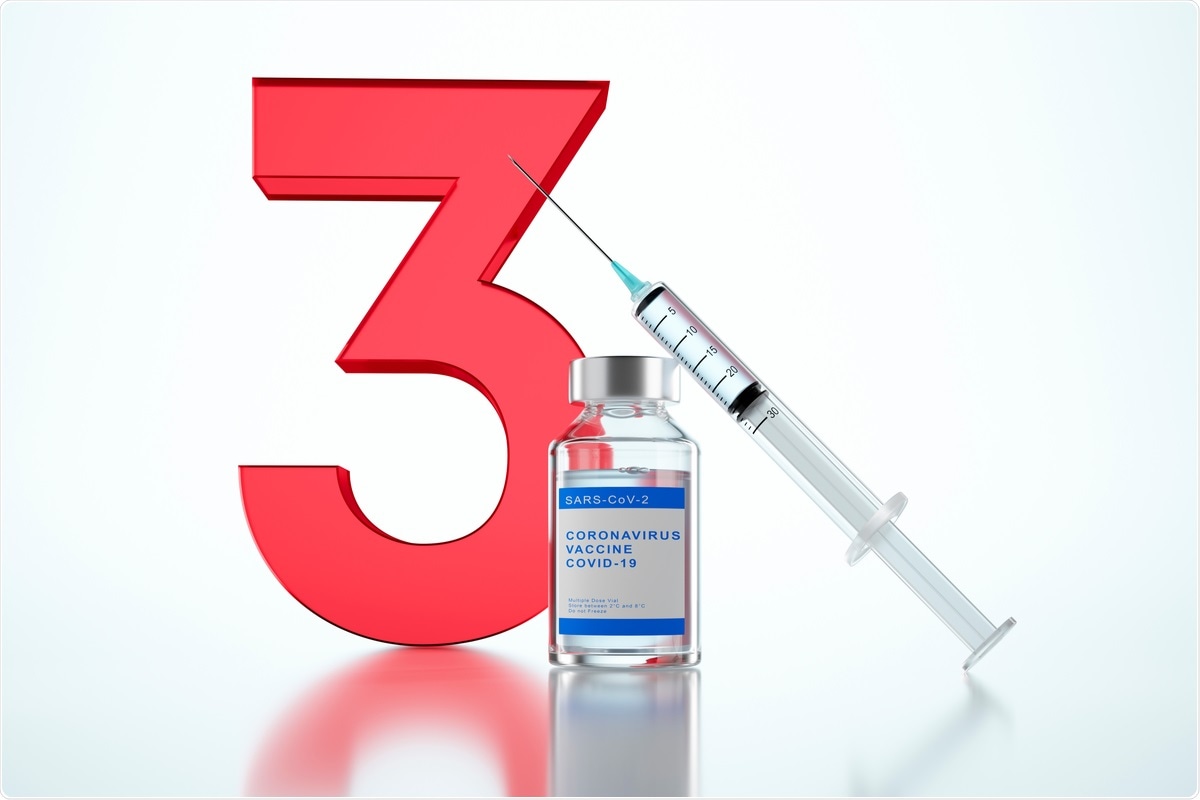The Delta (B.1.617.2) variant of severe acute respiratory syndrome coronavirus 2 (SARS-CoV-2) exhibits higher infectiousness and moderate immune evasion. In addition, owing to the increasingly waning vaccine-induced immunity, several countries have proposed the concept of a third dose of vaccination, particularly in individuals who are likely to contract severe disease. Another school of thought opinionates that achieving higher percentages of vaccinated individuals in populations would provide a larger public health benefit by reducing the evolutionary potential of the virus than providing third doses to already vaccinated individuals.
 Study: Third doses of COVID-19 vaccines reduce infection and transmission of SARS-CoV-2 and could prevent future surges in some populations. Image Credit: peterschreiber.media/ Shutterstock
Study: Third doses of COVID-19 vaccines reduce infection and transmission of SARS-CoV-2 and could prevent future surges in some populations. Image Credit: peterschreiber.media/ Shutterstock

 *Important notice: medRxiv publishes preliminary scientific reports that are not peer-reviewed and, therefore, should not be regarded as conclusive, guide clinical practice/health-related behavior, or treated as established information.
*Important notice: medRxiv publishes preliminary scientific reports that are not peer-reviewed and, therefore, should not be regarded as conclusive, guide clinical practice/health-related behavior, or treated as established information.
The study
A new study published in medRxiv* examined protection against symptomatic coronavirus disease 2019 (COVID-19) from non-Delta variants using data from randomized control trials. The present study involved mapping neutralizing antibody titers to protect against symptomatic and asymptomatic disease and infections from Delta and non-Delta variants.
Here, data were collected from literature, including ongoing systematic reviews on protective efficacy and effectiveness of vaccines and convalescent sera for SARS-CoV-2. Each study was categorized by the variant type – Delta and non-Delta. This study quantified secondary attack rates using qPCR tests of contacts that were symptomatic or tested positive.
Data on neutralizing antibody titers were obtained following vaccination with the Pfizer-BioNTech vaccine at several time points – between one month after the second dose and eight months post second dose, as well as one month after a third dose. It was noted that the rates of waning for hybrid immunity post-infection and vaccination with Pfizer-BioNtech and Moderna vaccines combined were statistically comparable to those following vaccination with Pfizer-BioNtech.
Findings
The results depicted strong relationships between the ratio of neutralizing antibody titers to convalescent sera and protection against symptomatic infection and all infections. The protection was highest for symptomatic disease for non-Delta variants.
It was estimated that neutralizing antibodies produced by vaccination with the Pfizer-BioNtech vaccine wane 8.06-fold after eight months; however, the rate is higher during the first three months. This waning of neutralizing antibody titers is projected to reduce protection against all infections for the Delta variant by about 20% (from 80-60.4%). Additionally, this waning reduced the minimum protection against transmission. At the same time, a third dose of the Pfizer-BioNtech vaccine boosted antibody titers 25.9-fold than the levels after eight months of waning – which showed higher values than those one week after the second dose.
The findings suggested that boosting immunity by providing a third dose of the Pfizer-BioNtech vaccine to all doubly vaccinated individuals in the USA (56% of the total population) could reduce the pathogen reproductive number Rt by 22%. However, in regions where the vaccination rate is slightly higher (60%), but most individuals were not previously infected, for instance – in New Zealand, a third dose would not benefit in preventing a surge in infectivity with the same contact rates.
On the other hand, in populations with few previously infected individuals where vaccination is higher (75%), for example – in California, providing a third dose to at least 45% of the population could render an Rt of below 1.
Furthermore, even with pre-pandemic level contact rates, boosting could reduce Rt by a larger absolute amount in the US, but the same relative amount, 21%. However, the cases would still rapidly rise. Meanwhile, doubly vaccinating unvaccinated individuals instead would be more impactful and could reduce Rt to 1.49.
With pre-pandemic contact rates, even in a population with 100% vaccinated individuals, waning of vaccine and infection-derived immunity would lead to a surge in cases without boosting with additional vaccine doses. Whereas, boosting >21% of a fully vaccinated population could prevent a surge in cases even with pre-pandemic behavior.
Conclusion
The findings predicted that deploying vaccine doses to unvaccinated individuals has a larger effect on transmission, despite the substantial potential impact of boosting transmission. Many countries have already started providing third doses to protect at-risk individuals, and some countries have even implemented third doses for the general population to reduce transmission.
It was stated that if vaccine supplies can be increased to provide initial doses to populations with very low coverage, then ‘the third-dose to all’ strategy could help in reducing COVID-19 transmission. This protocol would directly protect boosted individuals, indirectly protect unvaccinated and vaccinated individuals, and reduce the chances of the emergence of SARS-CoV-2 variants.

 *Important notice: medRxiv publishes preliminary scientific reports that are not peer-reviewed and, therefore, should not be regarded as conclusive, guide clinical practice/health-related behavior, or treated as established information.
*Important notice: medRxiv publishes preliminary scientific reports that are not peer-reviewed and, therefore, should not be regarded as conclusive, guide clinical practice/health-related behavior, or treated as established information.